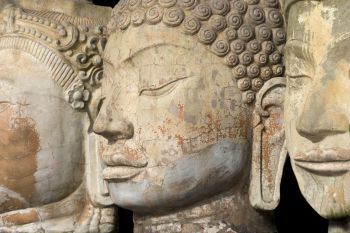
Publisher:
Bonnie King
CONTACT:
Newsroom@Salem-news.com
Advertising:
Adsales@Salem-news.com

~Truth~
~Justice~
~Peace~
TJP
Jun-21-2012 20:08

 TweetFollow @OregonNews
TweetFollow @OregonNews
Buddhism: Secular America's Religion?
Paul Louis Metzger, Ph.D. for Salem-News.comIt is not only Western Buddhists who must ask about the contextualization of the Buddha’s message to American culture.
 Courtesy: zenjuearthlynmanuel.com |
(PORTLAND, OR) - I have often thought that Buddhism would become the secular American’s religion of preference. James Atlas’ Sunday opinion piece in The New York Times gives me reason to think there may be merit to what I have pondered for years.
It is often said that Buddhism is more about practices and ethics than beliefs. Moreover, it has been argued that its particular emphasis on meditation may contribute to healthy changes in human physiology and speak to many post-moderns’ concerns to move beyond the mind-body dualism. Of course, there are other religious traditions that also challenge this division at a fundamental level, including movements within Christianity, but it is interesting to see how the Buddhist community may be shaping the conversation today. I look forward to dialoguing with Buddhists, fellow Christians, and others on this and related topics and collaborating with them on increasing secular America’s spiritual sensitivities in our post-Christendom context.
Still, I was struck by Atlas’ terms like “nightstand Buddhists” (taken from Thomas A. Tweed) and “Newddhists” and wonder if this Western fascination with Buddhism always reflects its Eastern sources at a fundamental level. For example, former Buddhist and Roman Catholic author Paul Williams says that the Buddhist notion of rebirth was not viewed positively in places like India. In The Unexpected Way: On Converting from Buddhism to Catholicism, Williams writes, “Rebirth, in Buddhism and other early Indian systems of liberation, was seen as horrific. To point out that ‘my’ rebirth involves among other things the destruction of everything that counts as me would have been seen simply as emphasizing how horrible rebirth is, and the need to escape from it through spiritual liberation, nirvna.” Rebirth in the West is often approached much more positively. While some argue that Williams’ point pertains to one fairly narrow perspective, mostly in Theravada Buddhism, nonetheless, nightstand devotees of the Buddhist or any other path must account for embracing the world in all its suffering rather than seeking to escape from it.
It is not only Western Buddhists who must ask about the contextualization of the Buddha’s message to American culture. I often ponder the same theme, when reflecting on the reception of Christianity in America today. We have our fair share of “nightstand Christians.” For example, how does the prosperity gospel movement reflect well the call of Jesus to die to ourselves, give to the poor, and store up for ourselves treasures in heaven? We Christians have been guilty at times of putting a power-of-positive-thinking spin on Jesus’ very hard teachings and have lost out on the power of the gospel to die to our selfish desires in service to others in the face of great suffering in the world. Christians and Buddhists alike must be sensitive to how they convey their traditions’ essential teachings to diverse cultural contexts, demonstrating the complexities and cost involved in pursuit of their ideals.
Engaged Buddhism—that form of Buddhism concerned for addressing social injustices referenced in Atlas’ article—intrigues me. My partnership with Zen Buddhist Priest Kyogen Carlson has led us to ponder how spiritual movements can partner together today to address social inequities that reflect our shared concern for human well-being. Features of our partnership are reflected in the book, Connecting Christ: How to Discuss Jesus in a World of Diverse Paths. While we see ultimate reality differently, and while we may approach the sacred-secular and mind-body problems differently, we can still collaborate in order to address the longing for value, meaning and justice in a culture stripped of the sacred and wallowing in the mundane.
Paul Louis Metzger, Ph.D., is the Founder and Director of The Institute for the Theology of Culture: New Wine, New Wineskins and Professor at Multnomah Biblical Seminary/Multnomah University; Charter Member, Evangelical Chapter of the Foundation for Religious Diplomacy; and Author of Connecting Christ: How to Discuss Jesus in a World of Diverse Paths (Thomas Nelson, 2012).
-------------------------------
Tweet
Follow @OregonNews
Paul Louis Metzger is Professor of Christian Theology & Theology of Culture at Multnomah Biblical Seminary/Multnomah University and author of Connecting Christ: How to Discuss Jesus in a World of Diverse Paths (Thomas Nelson, 2012).
 |
 |
 |
 |
 |
 |
 |
Articles for June 20, 2012 | Articles for June 21, 2012 | Articles for June 22, 2012



googlec507860f6901db00.html
Quick Links
DINING
Willamette UniversityGoudy Commons Cafe
Dine on the Queen
Willamette Queen Sternwheeler
MUST SEE SALEM
Oregon Capitol ToursCapitol History Gateway
Willamette River Ride
Willamette Queen Sternwheeler
Historic Home Tours:
Deepwood Museum
The Bush House
Gaiety Hollow Garden
AUCTIONS - APPRAISALS
Auction Masters & AppraisalsCONSTRUCTION SERVICES
Roofing and ContractingSheridan, Ore.
ONLINE SHOPPING
Special Occasion DressesAdvertise with Salem-News
Contact:AdSales@Salem-News.com

Terms of Service | Privacy Policy
All comments and messages are approved by people and self promotional links or unacceptable comments are denied.
[Return to Top]
©2026 Salem-News.com. All opinions expressed in this article are those of the author and do not necessarily reflect those of Salem-News.com.